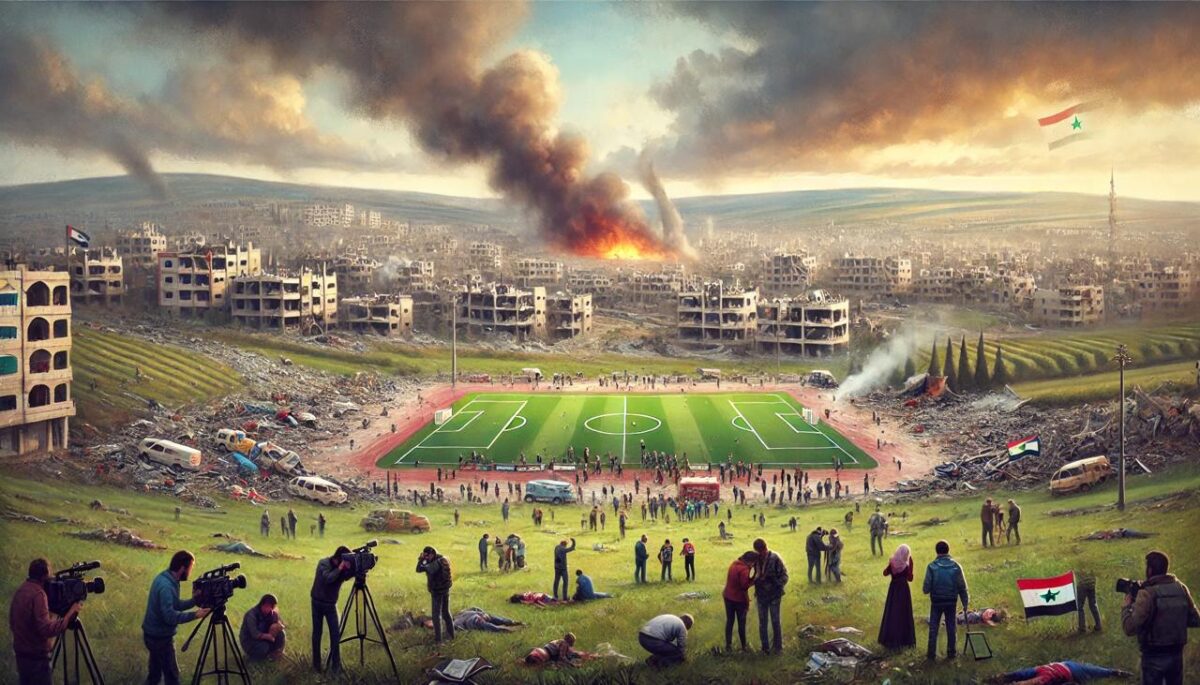
Lebanon, Israel and the region since Majdal Shams’ attack. How the media’s shaping of narratives can exacerbate tensions, justify military actions, and lead to a cycle of retaliation and violence, sidelining the actual facts of the situation
The tragic events of last week in Majdal Shams, where a rocket strike killed 12 Druze children and young people playing on a football field, have catalyzed a series of significant developments. The immediate aftermath saw a wave of international reactions, including urgent travel advisories and flight cancellations to Lebanon, heightened fears of imminent attacks on social media, and the assassination of three key leaders from the ‘axis of resistance.’ This confluence of events underscores the powerful role that narratives play in shaping perceptions and realities in conflict zones.
Facts vs. Narratives
In the realm of conflict, the distinction between facts and narrative becomes crucial in shaping public perception and policy decisions. Facts are objective realities – events that are indisputable and verifiable. Narratives, on the other hand, are interpretations and framings of these facts, often influenced by subjective perspectives and agendas.
Take the recent rocket strike in Majdal Shams. The fact of the rocket strike and the resulting casualties is clear and undisputed. However, the narratives surrounding this event diverge significantly:
Hezbollah Accusation Narrative: Some narratives accused Hezbollah of launching the rocket. This framing positions Hezbollah as the primary aggressor, emphasizing their responsibility for the initial attack and highlighting the group’s militant actions as a significant threat.
Israeli Orchestration Narrative: Conversely, other narratives suggested that Israel might have orchestrated the event. This interpretation implies that Israel’s military response was not merely reactive but part of a broader strategic operation, portraying Israel’s actions as disproportionately severe and possibly manipulative.
The critical aspect of narratives is that the actual truth of what happened often becomes secondary to the stories people share and believe. These narratives shape public opinion, influence international responses, and drive policy decisions. For instance, the framing of Hezbollah as the aggressor may justify severe retaliatory measures by Israel and garner international support for such actions. On the other hand, framing Israel as orchestrating the event to justify its military operations can lead to widespread condemnation and calls for restraint.
Impact on Perception and Policy: This divergence in narratives affects how events are perceived globally. When media and political rhetoric focus on a specific narrative, it influences the international community’s stance, as well as the local population’s perception of the conflict. This shaping of narratives can exacerbate tensions, justify military actions, and lead to a cycle of retaliation and violence, often sidelining the actual facts of the situation.
Responsibility of Hezbollah
Whether it is this narrative or that however, Hezbollah’s involvement in the conflict is significant, and its actions have profound implications for Lebanon’s security. The organization’s decision to launch rockets into Israel and its subsequent military engagements invite severe retaliations. These actions escalate the conflict on one hand and place Lebanon in a precarious position, subjecting its civilian population to heightened risks and international isolation on the second.
Repercussions on Lebanon and the Lebanese
Monopolization of Decisions: Hezbollah’s control over defense matters effectively sidelines other political factions and undermines democratic processes in Lebanon. This monopolization contributes to internal divisions and weakens the overall governance structure, making it difficult for Lebanese to be united in the aftermath, and for Lebanon to present a united front in international diplomacy and conflict resolution.
Impact on Civilians: The civilian population bears the brunt of these geopolitical maneuvers. Flight cancellations and travel advisories not only disrupt daily life but also create an environment of fear and uncertainty. Economic repercussions from reduced tourism and foreign investment further strain the already struggling Lebanese economy.
Need for Inclusive Defense Strategy
It is crucial for Lebanon to develop an inclusive defense strategy that involves multiple stakeholders, rather than relying solely on Hezbollah. This approach would help mitigate the narrative that the conflict is solely between Israel and Hezbollah or, worse, a sectarian struggle involving Shiites. A unified national defense strategy would enhance Lebanon’s sovereignty and stability, making it less vulnerable to external pressures and internal divisions.
Geopolitical Interests and Sovereignty
Western Interests: Western countries’ differing approaches to Israel and Lebanon reflect broader geopolitical interests. Israel’s strategic importance to the West often results in a more nuanced response to its actions, characterized by sympathetic media coverage and substantial military aid, framed as essential for maintaining regional stability and countering terrorism. Conversely, Lebanon, lacking such geopolitical weight, is subject to harsher assessments and advisories, portrayed through a lens of instability and danger due to Hezbollah’s influence. This double standard underscores how narratives, shaped by media and political agendas, influence policy decisions and international relations. The impact of these narratives is profound, driving policy decisions that often exacerbate regional tensions and contribute to political instability within Lebanon. Recognizing and critically evaluating these narratives is crucial for fostering more balanced and equitable international policies, ultimately supporting more effective conflict resolution and diplomatic efforts.
Balanced Reporting: To address these discrepancies, there is a need for more balanced and nuanced reporting that accurately reflects the complexities of the region. Highlighting the strategic calculations of all parties involved, rather than focusing disproportionately on one side, can help create a more informed and less biased perception of the risks and realities on the ground.
Ramzi Abou Ismail is a political psychologist and researcher at the University of Kent.
The views in this story reflect those of the author alone and do not necessarily reflect the beliefs of NOW.








